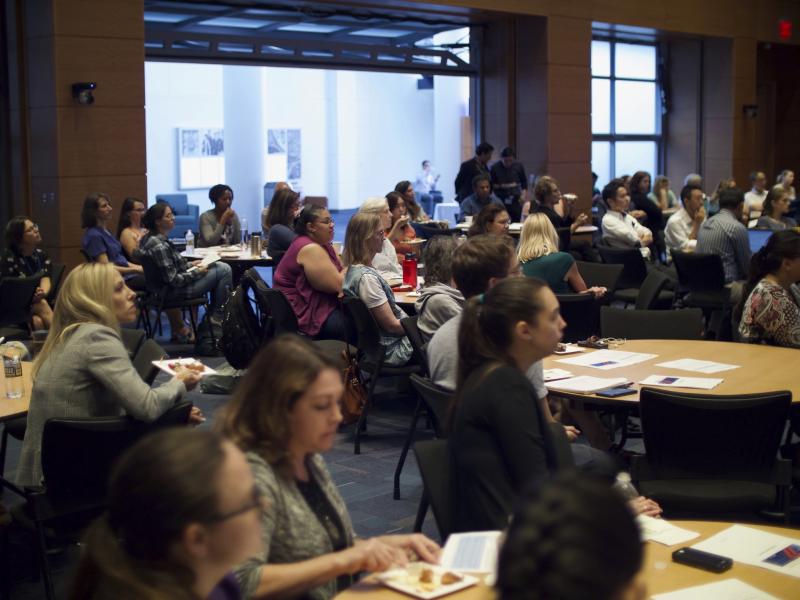
Sexual harassment is illegal. Falsifying documents is illegal. But unfortunately, bullying – in most of its shapes and forms—is not. Yelling, name-calling, insulting, belittling and selectively leaving employees out of meetings and email exchanges is not prosecutable in a court of law, but it can be prevented and dealt with by training organizations to respond and build policies around abolishing this sort of behavior, says bullying expert Leah Hollis, EDD, an associate professor at Morgan State University.
Hollis, who penned the book “Bully in the Ivory Tower: How Aggression and Incivility Erode American Higher Education,” visited Duke University on Sept. 9 to speak to School of Medicine and Duke Health employees about how to recognize bullying in the workplace. The event, “Empowering Community in the Face of Bullying,” was hosted and sponsored by the Duke Office of Scientific Integrity.
Hollis was the keynote speaker for the event, but participants also heard from Geeta Swamy, associate vice president for research for Duke University and vice dean for scientific integrity for the School of Medicine, Ann Brown, vice dean for faculty in the School of Medicine, and Ada Gregory, associate director at the Kenan Institute for Ethics and student ombudsperson for the Duke Office for Institutional Equity.
All four speakers noted the toll that bullying can take on an organization. More than 54 million people in the United States are impacted by bullying annually, said Hollis, and the costs of this—which include decreased productivity, employee turnover, and error due to emotional turmoil— costs the nation as much as $64 billion annually. But besides the costs to an organization, what about the individual people affected?
“I’m sad when I read about what happens to people who are bullied,” said Hollis. “Just like adolescents, adults who are bullied also consider suicide.”
Bullying is tough to deal with, says Hollis, because it often involves a power deferential. When leaders bully their employees or others lower on the hierarchical framework in an organization, it becomes more difficult to speak up because an employee fears losing their job or even ruining their career in that particular field.
Although it is worth contacting your organization’s human resources department about a bullying issue, keep in mind that the department may not have power from a legal standpoint to respond, said Hollis. Worse yet, in some cases leadership may keep the department from responding. In these cases, it becomes important to gain support in other ways.
“Tell others what is happening,” says Hollis, “and do not suffer alone.” Telling others may help you to gain perspective on the situation—perhaps this person is also bullying others. In many cases, a collective voice can stand up to a bully, she said, noting the success of the Me Too movement, in which the voices of multiple women have shed light on the inappropriate actions of those in power. Collective voice can also lead to important policy changes within an organization, said Hollis. The more you speak up, the more gets done.
Gregory offered participants another viewpoint—how to curb bullying when you are not the person being bullied, but a bystander. When callous behavior or insensitive remarks occur, a bystander can intervene directly in the moment by interrupting the behavior or remark with questions, setting limits for the type of language to be used at work, or appealing to shared values. Other strategies include delegating a friend or peer to intervene with you, distracting the bully, especially in heated situations, or delaying the intervention and checking in with the targeted individual afterwards to validate their experience and refer them to resources to resolve the issue.
Through role playing exercises, Gregory engaged participants in specific dialogue that can be used in situations to de-escalate the bullying. Intervening in these situations helps everyone in the workplace recognize that bullying is not acceptable and we all have a responsibility to stop it.
“As a leader in biomedical research and training, we have an ethical responsibility to prevent bullying of any kind,” said Swamy. “If we expect Duke faculty, trainees, students, and staff to thrive and serve as leaders in clinical care and biomedical research, we owe it to them to provide a safe, supportive learning and work environment. Open discussions like today’s event help us to get one step closer to achieving that.”